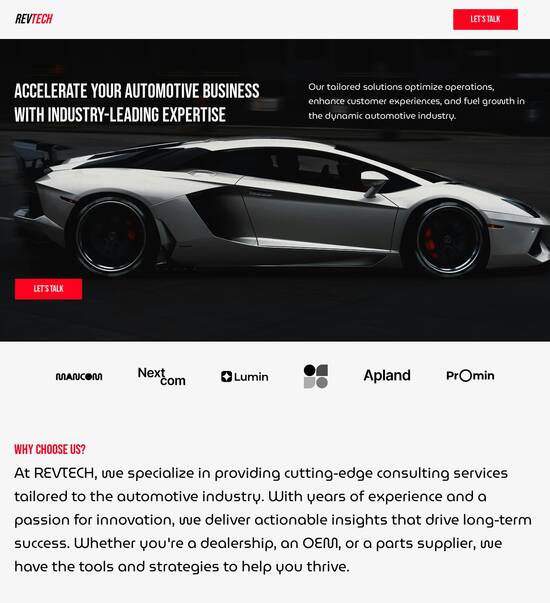
One page website template for Ruby on Rails developers
Explore Similar TemplatesAbout template
Achieve your online goals with the one page website template for Ruby on Rails developers.
Recommended templates

Easy to build without coding
With the intuitive drag-and-drop builder, anyone on your team can create high-converting pages without any knowledge of code or design. Make enhancements to your landing page with custom widgets using Javascript, HTML/CSS, or third-party scripts.

Multiple layouts for any industry and goal
Select from 500+ landing page layouts built to boost conversions across industry-specific scenarios. Customize them by adjusting fonts, adding images, and generating on-brand content with the AI assistant. Quickly scale with Instablocks® and Global Blocks that you can save, reuse, and update globally.

Loads fast and looks polished on any device
Every template is responsive, which means they present professionally on any device and load blazingly fast with our Thor Render Engine. You can also power them up with Google AMP technology to deliver an unparalleled mobile experience and drive higher conversions.

Robust analytics & experimentation
Get real-time updates and reporting across all your devices, showing the number of visitors, conversions, cost-per-visitor, and cost-per-lead. Launch AI-powered experiments, run A/B tests, and use heatmaps to analyze user behavior, then optimize your landing page to maximize conversions.







Easy to build without coding
With the intuitive drag-and-drop builder, anyone on your team can create high-converting pages without any knowledge of code or design. Make enhancements to your landing page with custom widgets using Javascript, HTML/CSS, or third-party scripts.
Multiple layouts for any industry and goal
Select from 500+ landing page layouts built to boost conversions across industry-specific scenarios. Customize them by adjusting fonts, adding images, and generating on-brand content with the AI assistant. Quickly scale with Instablocks® and Global Blocks that you can save, reuse, and update globally.
Loads fast and looks polished on any device
Every template is responsive, which means they present professionally on any device and load blazingly fast with our Thor Render Engine.
Robust analytics & experimentation
Get real-time updates and reporting across all your devices, showing the number of visitors, conversions, cost-per-visitor, and cost-per-lead. Launch AI-powered experiments, run A/B tests, and use heatmaps to analyze user behavior, then optimize your landing page to maximize conversions.
All the features you need to build lead-generating landing pages
Explore more featuresLearn how to build top-performing landing pages for any goal
FAQs
Leading the way in building high-performing landing pages





Maximize Your ROI with Instapage: The Ultimate Guide to Powerful Landing Page and CRO Strategies
As a marketer, driving high conversion rates is your top priority, and utilizing the best tools for effective landing page and conversion rate optimization (CRO) can make a significant difference. Instapage’s versatile platform empowers businesses across various sectors such as tech, education, and financial services to streamline their digital marketing efforts with ease.
Understanding Landing Pages and Their Importance
Landing pages are standalone web pages created specifically for marketing campaigns. They serve as the primary destination for online ads or links that aim to convert visitors into leads or customers. A well-optimized landing page can significantly boost engagement and conversion rates by providing tailored content to encourage specific actions.
- Targeted messaging: Craft messaging that resonates with the audience's needs to ensure relevance and increase the chances of conversion.
- Single call-to-action: Focus on a single goal, whether that's signing up for a newsletter or making a purchase, to reduce confusion and enhance the user experience.
- Visual elements: Use images and videos strategically to capture attention and convey your message effectively.
Step 1: Accessing Ready-to-Use Templates
With Instapage, you have access to over 100 high-converting templates designed for various industries. These professionally crafted layouts are customizable, allowing instant deployment without the need for coding. Start by selecting a template that aligns with your campaign objectives.
Step 2: Optimize for Conversions
Utilize Instapage's built-in experiments and analytics tools to A/B test various elements on your landing page. Determine what resonates best with your audience and continuously iterate for improved results.
- Heatmaps: Leverage heatmaps to understand on-page behavior, showing where users click, scroll, and spend their time, allowing for informed design adjustments.
- Detailed analytics: Monitor conversion rates, traffic sources, and user behaviors to refine your strategy further.
- Quick tests: Run A/B tests on headlines, images, and CTAs to identify the most effective variations.
Step 3: Enhance Personalization
Personalized experiences lead to higher engagement levels. Use dynamic text replacement and adaptive content that aligns your landing pages with the specific interests of your audience segments.
- Dynamic ads alignment: Integrate ad maps for seamless audience targeting and tailored page delivery.
- Audience-specific metrics: Track how each audience segment interacts with your pages and refine strategies based on data.
- Content variation: Modify messaging and visuals based on user demographics and previous interactions for a more compelling browsing experience.
By following these steps, you can create powerful landing pages that attract, engage, and convert your target audience effectively.
Ready to elevate your marketing game? Start leveraging the advanced features of Instapage today and watch your conversion rates soar!
People also ask about One page website template for Ruby on Rails developers
The essence of one page website templates for Ruby on Rails developers
Understanding one page websites
One page websites are concise online platforms that present all their content within a single page. This format is not just a trend; it has become increasingly relevant in various sectors, including business, non-profits, and personal portfolios. With the decline in user attention spans, the ability to provide essential information upfront is paramount. Typically, these websites utilize scrolling to navigate different sections seamlessly, facilitating a user-friendly experience. As more brands recognize the importance of ease of use, the demand for one page designs continues to grow.
For developers, one page websites offer numerous advantages. The streamlined development process enables quicker project turnarounds. Since all content is centralized, developers can focus on optimizing design and functionality without the complexities of multiple web pages. Furthermore, user experience is elevated as visitors can browse through content without excessive clicking or loading times. Lastly, one page websites often perform well on mobile devices, simplifying the user journey and enhancing search engine optimization with fewer URL redirects.
Core features of one page website templates
Technological foundations: Integration of Ruby on Rails for its powerful backend services creates a solid framework for developers. Utilizing front-end frameworks like Bootstrap or Tailwind CSS further enriches the design process, while RESTful principles with JSON facilitate effective data handling.
Flexible layout options: One page templates offer modular designs that allow customization to meet project needs. The responsive features ensure that users access a consistent experience across all devices, from desktops to smartphones.
Efficient data binding concepts: Understanding data binding in single-page applications is crucial. By leveraging AJAX calls, developers can ensure real-time data updates, enhancing the overall performance and interactivity of the website.
Interactive components: Templates often include engaging features such as forms, Q&A sections, and community-driven content spaces, allowing users to interact meaningfully and feel involved.
Crafting content for one page websites
Creating content that fits the one page format requires strategic structuring. Developers need to prioritize concise messaging that communicates value quickly. A strong visual hierarchy will help guide the user seamlessly from one section to another, ensuring they absorb the most important information first. Using attention-capturing highlights and previews can significantly improve the chances of retaining visitor interest.
Community engagement can be fostered through well-structured content. Integrating feedback loops allows for continuous improvement based on user interactions. This two-way communication can be leveraged to build a knowledge base, supporting users in their inquiries while enriching the overall content experience. A collaborative approach to content also enhances learning opportunities both for the development team and the user base.
Creating a seamless user experience
User experience is key in the design of one page websites. Developers must ensure access management by implementing user authentication and authorization processes within Rails. These measures not only foster trust but also protect sensitive data, creating a secure environment where users feel safe to engage with the site.
Performance optimization is another critical area. Unlike traditional multi-page websites, one page websites need to load quickly to maintain user interest. Developers can utilize techniques such as minimizing HTTP requests, optimizing image sizes, and employing content delivery networks to ensure fast loading times. Efficient data retrieval ensures users have a smooth experience, capable of interacting with dynamic content without frustration.
Build and deployment process
The build and deployment process for a one page website requires specific tools and technologies. Recommended IDEs and code editors for Ruby on Rails, such as Visual Studio Code or RubyMine, offer developers support throughout the coding phase. When it comes to deployment, popular options like Heroku and AWS provide the scalability needed for growing projects, ensuring developers can manage resources effectively as traffic increases.
Testing is a vital part of the development cycle. Implementing robust unit tests and integration tests allows developers to identify issues early, significantly reducing potential problems during deployment. Continuous user feedback during the iteration phase can also inform design improvements and necessary adjustments, fostering a cycle of enhancement that benefits both developers and users alike.
Visual design and aesthetics
Aesthetic choices play a crucial role in how users perceive a one page website. Developers should select color palettes that align with the brand's identity, ensuring that they resonate well with the target audience. The strategic use of colors can enhance brand recognition while also influencing user emotions during their visit.
Typography is equally important, as it directly affects readability and user focus. Choosing the right fonts, sizes, and spacing can significantly enhance the viewing experience. Additionally, incorporating graphics, images, and videos not only boosts engagement but also fosters deeper connections with users. However, accessibility considerations should always guide multimedia content choices, ensuring that all users can access the information effectively.
Case studies and real-world applications
Examining successful implementations of one page websites provides valuable insights for developers. For instance, businesses that have utilized templates effectively report improved conversion rates and user engagement. They highlight the importance of clear calls-to-action and targeted content. Lessons learned from community-driven projects can also inform future designs, offering best practices that arise from real user experiences.
Various industries showcase innovative uses of one page websites. In the tech sector, these platforms are frequently used for product launches and feature showcases, allowing companies to present information succinctly. Non-profits leverage this format for awareness drives and fundraising campaigns, harnessing the visual appeal to convey impact. E-commerce businesses often opt for one page layouts to streamline product displays, particularly for limited-time promotions.
Future trends in one page website development
Looking ahead, emerging technologies will continue to shape the landscape of one page website development. The integration of AI and machine learning can enhance user personalization and streamline content delivery. Predictive analytics tools allow developers to understand user behavior better and adjust website components for improved engagement. These advancements hold the promise of even more tailored user experiences.
The growing community involvement in template creation is also noteworthy. A shift towards open-source contributions reflects the collaborative spirit among developers. Community forums provide excellent opportunities for knowledge sharing, troubleshooting, and enhancing best practices. This collective approach not only fosters innovation but also nurtures a culture of continuous learning and improvement in web design.
Closing thoughts
Ruby on Rails developers would do well to consider the unique value propositions offered by one page website templates. This format allows technical individuals to focus on creating seamless, engaging user experiences with a strategic emphasis on performance and interactivity. As the web design landscape continues to evolve, the future holds exciting possibilities for these templates, further enhancing their capabilities and proven effectiveness.
Ready to skyrocket conversions?
Supercharge your ad campaigns with high-performing landing pages
Get started














